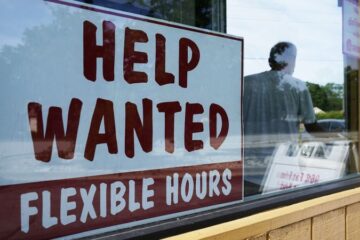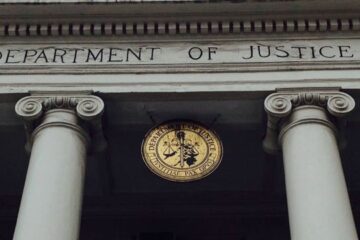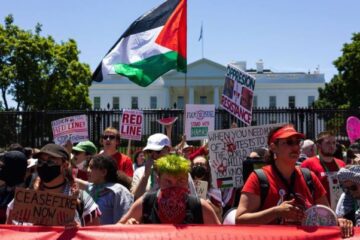Photo Facebook
The presidents of UCLA, Northwestern and Rutgers universities were questioned Thursday on Capitol Hill about pro-Palestine protests on campus Thursday, the fourth time in six months that the Republican-led House Education Committee has summoned school leaders to Washington over accusations of antisemitism.
Lawmakers reserved their heaviest questioning for the presidents of Northwestern and Rutgers, where Gaza solidarity encampments were voluntarily dismantled after students negotiated deals with university administrators.
Northwestern journalism professor Steven Thrasher, who has been an outspoken supporter of the Gaza solidarity encampments at his school and elsewhere, was singled out during the hearing and described as a “goon,” but he tells Democracy Now! he is undeterred in both his pro-Palestine advocacy and defense of his students.
“It’s supposed to scare everybody who supports Gaza. It’s supposed to scare everybody who’s against the genocide. It’s supposed to scare students who are righteously standing up against the killing that’s happening,” says Thrasher.
Transcript
AMY GOODMAN: The presidents of UCLA, Northwestern and Rutgers universities were grilled by lawmakers on Capitol Hill Thursday about pro-Palestine protests on campus. The hearing marked the fourth time in six months that the Republican-led House Committee on Education and the Workforce summoned school leaders to Washington for questioning about alleged antisemitism.
During the hearing, lawmakers reserved their heaviest questioning for the presidents of Northwestern and Rutgers, the two universities where Gaza solidarity encampments where voluntarily dismantled after protesting students negotiated deals with university administrators.
At UCLA, police violently raided the pro-Palestine encampment with flash grenades, rubber bullets and tear gas a day after pro-Israel counterprotesters attacked the encampment with fireworks and metal rods. Dozens were arrested.
Thursday’s hearing marked the first time the heads of public universities — UCLA and Rutgers — were brought to testify before Congress on the issue.
Our next guest, Steven Thrasher, is a professor of journalism at Northwestern University, an outspoken supporter of the Gaza solidarity encampments at Northwestern and other schools. In fact, Thrasher was singled out during Thursday’s hearing by Republican Congressmember Jim Banks of Indiana as he was grilling Northwestern President Michael Schill.
REP. JIM BANKS: Let me ask you about Steven Thrasher, who’s one of the goons in the photo behind me. He’s a professor of journalism at Northwestern. He and several of your faculty members locked arms. They scuffled with police officers, blocked the police officers on your campus from doing their job. Do they continue to teach students at Northwestern University after this embarrassing incident?
MICHAEL SCHILL: So, I will not comment on individual faculty members, nor on matters —
REP. JIM BANKS: President, is it — is it your decision, your decision alone, to allow those professors to continue to teach students on your campus?
MICHAEL SCHILL: We believe in due process at the — at Northwestern University.
REP. JIM BANKS: You believe in due process except for —
MICHAEL SCHILL: We will follow —
REP. JIM BANKS: — the decision that you made about Coach Fitzgerald.
MICHAEL SCHILL: We followed the contract. That was —
REP. JIM BANKS: Had your cake and eat it, too.
MICHAEL SCHILL: — due process. We had an investigation. But I don’t — I’m not going to go on and on about that.
REP. JIM BANKS: These — is it OK for faculty members at Northwestern University to scuffle with police officers, to lock — lock arms and present [sic] police officers from doing their job? You said — you said, in your opening statements, that this encampment was responsible for antisemitic behavior that made Jewish students feel unsafe to go to class. Is it OK for faculty members — do they — is it OK? Do they get away with that at Northwestern University?
MICHAEL SCHILL: I am not going to comment on ongoing investigations in faculty personnel matters.
REP. JIM BANKS: Unbelievable.
MICHAEL SCHILL: There is a rule at the university —
REP. JIM BANKS: Unbelievable, President Schill, that —
MICHAEL SCHILL: — that that is confidential.
REP. JIM BANKS: — that those faculty members would continue to have a job. Thrasher, by the way, is something of a professional prognosticator. In fact, he went to Columbia University to participate in their encampment, and you pay his bills. You’re responsible for Steven Thrasher’s activities, which is really, really crazy.
AMY GOODMAN: That was Republican Congressmember Jim Banks of Indiana questioning Northwestern President Michael Schill about professor Steven Thrasher.
Well, Professor Thrasher joins us now from Chicago. He’s the chair of social justice in reporting at the Medill School of Journalism at Northwestern. He’s also a columnist at Literary Hub and the author of The Viral Underclass: The Human Toll When Inequality and Disease Collide. His latest column for Literary Hub is headlined “You Are Being Lied to About Gaza Solidarity Camps by University Presidents, Mainstream Media, and Politicians.”
Professor Thrasher, welcome back to Democracy Now! Can you respond to the questioning and you particularly being singled out in this congressional hearing?
STEVEN THRASHER: Well, as a journalist, I’m not used to being the subject of the story. It was quite a terrifying experience. I don’t think that I’m a goon, and I’m certainly not a prognosticator, which I think means somebody who can tell the future.
But the point of all of this is something that I don’t take personally. I teach, actually, a video that you made, Amy, in most of my classes about manufacturing consent. And that’s what all of this is about. It’s supposed to scare everybody who supports Gaza. It’s supposed to scare everybody who’s against the genocide. It’s supposed to scare students who are righteously standing up against the killing that’s happening. And it’s supposed to scare faculty into not supporting our students, not protecting our students, not meeting our first responsibility, which is to make sure that they are safe, and our other responsibilities, which is to make sure that they have learning opportunities.
And what happened on these — in many of these encampments — I’ve had the opportunity to visit five of them. I was not a participant in the one at Columbia. I went there as a reporter for the piece that I wrote for Literary Hub and for ongoing research that I’m doing about protests in America. But one of the really amazing things about these spaces I’ve seen is they are dynamic learning — they are dynamic learning and pedagological spaces. It’s really beautiful seeing students experimenting with creating a different kind of society, not just accepting what they’re being handed in America, and — something that I’ve heard at multiple different encampments — thinking about what a free Palestine would look like. And one of those things that they are experimenting with is understanding that a free Palestine, like a free New York City or a free Chicago or a free Evanston, would be a place where people who are Jewish, Muslim, Christian, Hindu, Native American, or of any faith or no faith, would have equal rights and would have equal responsibilities and would live in peace and prosperity under the law, but where they would still hold onto their cultures and teach one another about them. And that’s been a really beautiful thing to see in the different camps.
AMY GOODMAN: Professor Thrasher, you’re wearing a keffiyeh right now. What does that mean to you?
STEVEN THRASHER: To me, it makes me think of how I’ve been talking about this issue for five years. I feel a bit like I’m in Groundhog Day, because I talked about this issue at my graduation speech at NYU literally five years ago on Sunday, and then had a very difficult meeting a week afterwards, and then having a very, very intense meeting a week again this time.
But it really makes me think of a dear friend of mine whose name is Mohammed. In 2019, when I was going through it for speaking about this issue, for defending Students for Justice in Palestine and Jewish Voices for Peace on my campus as a graduating student at NYU, which of course is an issue now on hundreds of campuses around the country, a young man in Gaza named Mohammed wrote to me and told me how much he supported me and told me that the people in Gaza were sharing my speech and were really appreciative of somebody at an American university talking about it. And that’s a message I’ve seen happen at all these encampments, that people in Gaza are telling them what it means for them for students to stand up for them.
And so, Mohammed and I have been pen pals for these years. I was relieved to know that he had gotten married to a Palestinian Canadian partner, had moved to Canada, and so I was relieved to know that he was not going to be in danger when I heard everything that was happening in Gaza this fall. But he has suffered tremendous loss. Both his mother and his father were killed by snipers. Many people in his family have been killed. I also have Palestinian cousins through marriage to my aunt, and they have many relatives in the area that are in danger.
And so I wear this keffiyeh to remind myself that this is not an abstract talk about free speech. This is a matter of life and death for wonderful, beautiful, artisitic, political people who are losing their lives, young people, old people, more than 140 journalists, from my profession, who have been murdered, more than 15,000 children who have been killed.
And it’s also a reminder for me that there is love and beauty in this. After the comments that came from Representative Banks yesterday, I have never felt more loved and supported from people around the world. And it’s reminded me that when I see other people wearing keffiyehs, that we have a connection to one another. And it’s reminded me that there is so much love and beauty and connection. Even as people might face ostracization or they might face HUAC-style bad things happening to them in Congress, there is this connection that you find with people all over the world, and we’re all wanting a world that has more peace and love and justice. So that’s why I wear it.
AMY GOODMAN: Congressmember Banks claimed you were filmed scuffling with police and that it was shown. We don’t see that in the film. We see the police hitting and pushing you and kicking you. It reminded me of professor Orleck at Dartmouth. She was the former head of the Institute for Jewish Studies there. And she, too, was body-slammed to the ground. Can you talk about how the police are dealing with these protests? But also during the congressional hearing, Northwestern President Schill defended his decision to negotiate an agreement with pro-Palestine student protesters who had set up the encampment. He was being attacked for doing that. And I’m just wondering if you can talk about what that agreement was all about.
STEVEN THRASHER: Sure. So —
AMY GOODMAN: Two questions.
STEVEN THRASHER: There is a great mischaracterization of what’s happening between protesters, faculty and police. I’ve been to five of these encampments. They are incredibly beautiful spaces. I find it hard to believe that ours was antisemitic in any way. I never heard of any complaints about that. What I did see were Jewish students, including some of mine, of whom I was very proud, leading the Passover prayers. Our encampment overlapped with Passover, three nights of it that I was there in the evening. There were sundown Passover prayers. I saw students teaching about Pesach, teaching about the foods that were being served, their connection to Judaism and how it called for them ethically to be involved in the issue for a free Palestine. And two of the moments that were most memorable for me were singing the song “Dayenu,” which was one of the first Passover songs that I learned when I first went to a Passover, and then they were literally passing around matzah to share with people. I received the matzah from my colleague Ricky, who is Jewish and was wearing a yarmulke. I’m a Christian. I took some of it, and I passed it on to somebody in a hijab. So, we were a Jew, a Christian and a Muslim all observing Passover together. So, I think the depiction that President Schill and other people have painted of the camps is wrong in saying that they are antisemitic.
I think the police are the element of violence. As you were talking about in the headlines, at UCLA, the camp was not violent until a Zionist group came and very violently attacked them, and the police let them, in a manner similar to how police used to let the KKK or other violent groups affect Black people. And then the police themselves are the violent element. And it’s not coincidental, including myself, that so many of the people you see being arrested are Black, queer, people of color, often untenured, many who are migrants or are here on visas, who are the most vulnerable people on campus, but who still feel it’s a calling for them to protect their students. At Northwestern, fortunately, the encampment ended without police violence. But it began with police violence.
I was on faculty support on the first morning, when the students asked for faculty to be there to help them. And I didn’t think the police would move in so quickly, but within just a few minutes, they did. So my colleagues and I formed a faculty defense line. And I feel it’s really important as the Daniel Renberg chair of social justice in reporting, as someone who’s teaching a class right now called “The Theater of Protest,” and as someone who teaches a lot about Martin Luther King and AIDS activists in groups like ACT UP, I knew that it was my responsibility to stand there and try to protect them, especially since we had seen such horrific violence the day before at the universities of Texas and UCLA. And as you can see in the video, we are not hitting the police. We’re not scuffling with them. We just hold onto each other. We take the blows. We’re hoping that we could take the blows so the students don’t take the blows. And we were successful. The police retreated. You can see in one of the videos that it’s — I think the police chief of the Evanston Police Department pulls them back. And so, we were able to create a safe space so that the students could express themselves. The encampment went on for five days.
I was not involved in any way in the negotiation for the ending. President Schill and other faculty and students came to an agreement that allows for a number of things, including questions about what the investments are at Northwestern University and, as he was questioned about extensively in front of Congress, about bringing Palestinian students and faculty to campus under very similar programs that exist to bring faculty and students from other war-torn places around the world, so there shouldn’t be much controversy about that.
President Schill and I don’t agree on a lot about the politics of Israel and Palestine. I do think that we — I did appreciate the way that he said that he would not talk about individual students and faculty, and that we should be allowed to have due process. We’ve seen horrific cases where people don’t get due process, including Mohamed Abdou at Columbia, who was very unceremoniously ended his — his employment was ended by the president of the university, Minouche Shafik, of Columbia University. But I do disagree with President Schill that these places were horrific places of antisemitism. I can only imagine, for him as a Jewish person, that it felt absurd being called an antisemite in front of Congress. And I think that it’s also absurd to call our many Jewish students, who are working in coalition with other students, antisemites just because they believe in a free Palestine.
AMY GOODMAN: Yes, and the president of Northwestern, the descendant of Holocaust survivors. Well, Steven Thrasher, the way journalism works — and you know how it works, as a professor of journalism — perhaps what got the most attention this week was that picture of you that went viral. “What Is Violet Affleck Trying to Tell Us? Jennifer Garner and Ben Affleck’s daughter was photographed with some pointed reading material.” She is holding your book, The Viral Underclass. I thank you so much for —
STEVEN THRASHER: I —
AMY GOODMAN: Yes, Steven.
STEVEN THRASHER: I’ve known about what was coming on Capitol Hill for about 10 days, so that was a very nice diversion. I found out that Violet Affleck is quite beloved in the disability community because she’s largely known as the only person in Hollywood who still masks at events. She also went out in a “free Palestine” T-shirt a few weeks ago. And so I was just really touched that she shared my book. And if I was going to be in the news around stuff happening in Washington, I was glad that people in Hollywood were also talking about my book. But I really, really appreciated the opportunity to just see somebody in a position of visual authority reminding people to keep masking in dense places and to keep taking COVID precautions, because in part of my life I’m a public health person, and COVID is not over, and we still need to — just as we do with our call for a free Palestine, we need to take care of one another, love one another and show community care for one another.
AMY GOODMAN: Steven Thrasher, Daniel Renberg chair of social justice in reporting at the Medill School of Journalism at Northwestern University, a columnist with Literary Hub. We’ll link to your most recent piece. His latest book, The Viral Underclass: The Human Toll When Inequality and Disease Collide.
Coming up, we go to Harvard. More than a thousand Harvard students walked out of their graduation in protest of 13 undergrads barred from graduating, taking part in the Gaza solidarity encampment. Stay with us.




